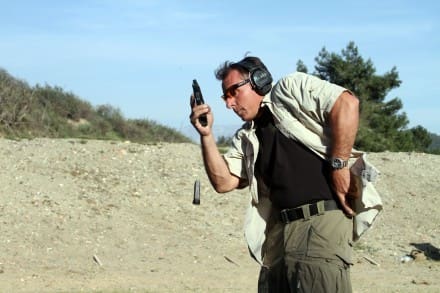What is it about the internet that has made asking questions something that has become all too rare in the training and firearms world? I have seen far too many instances of it and most especially in forums. Often there, questions are posed in an adversarial way that is actually an accusation which the one posing the question wants you to defend, deny or admit. It seems many are not looking for an answer but to validate an answer they already hold. Anyone that has trained with me knows I am all too glad to answer questions and that I won’t give one that is not well thought out … so why not just ask me something? Why does it have to be in reference to something someone else said? I often tell folks in my classes “I don’t care what anyone else said” and there are good reasons for that. It is because I have thought out, researched and validated my ideas and have already taken those of others into account. I also was not present when the named individual said whatever it was that he or she said and so I really don’t know what the response was EXACTLY. One word in a sentence can make something sound completely different than the original statement and so if I didn’t hear it, who am I to assume I know what was said? If I see a video I feel completely free to comment on it because I watched it. I see many comments that say “context is important here” but then fail to comment on the context that they think has been misconstrued even though you watched the video. If you want to make a point feel free but don’t say someone is misunderstanding something and then not say why.
The point here is very simple to articulate. One should ask questions to find new knowledge and not to stir up controversy for the sake of it. You need only to present a question in an inquiring manner and then evaluate the answer for yourself. Making blanket statements or asking scenario based questions in order to try and lead someone into a rhetorical position where you can find some perceived intellectual flaw is a waste of everyone’s time and ends up branding you as a zealot or a fan-boy. One final note, if you are unwilling to put your real name out in public then why should someone who uses their real name answer you, especially if the questions are argumentative or adversarial?
The effects of the internet on personal and respectful decorum have been terrible. People are far more willing to be antagonistic and disrespectful behind a keyboard than in person and in the end we all lose out.
Ask questions because you seek knowledge, not to argue a position you don’t seek to clarify. Don’t mention your perception of another instructors’ comments unless the author can reference a transcript or was present during the statement.
Finally, don’t ascribe any desired intent or target of the article other than what the author stated. Some people say exactly what they mean and mean exactly what they say. I happen to be one of those people.
– Mike Pannone
Mike Pannone retired from the Army’s premier assault force (1st SFOD-D) after an explosive breaching injury. A year after his retirement America was attacked on 9/11 and he returned to help serve his country as the head marksmanship instructor at the Federal Air Marshals training course and then moved to help stand up the FAMS Seattle field office. In 2003 he left the FAMS to serve as a PSD detail member and then a detail leader for the State Department during 2003 and 2004 in Baghdad and Tikrit.
In 2005 he served as a ground combat advisor of the Joint Counter IED Task Force and participated on combat operations with various units in Al Anbar province. Upon returning he gave IED awareness briefings to departing units and helped stand up a pre-Iraq surge rifle course with the Asymmetric Warfare Group as a lead instructor. With that experience as well as a career of special operations service in Marine Reconnaissance, Army Special Forces and JSOC to draw from he moved to the private sector teaching planning, leadership, marksmanship and tactics as well as authoring and co-authoring several books such as The M4 Handbook, AK Handbook and Tactical Pistol shooting. Mike also consults for several major rifle and accessory manufacturers to help them field the best possible equipment to the warfighter, law enforcement officer and upstanding civilian end user. He is considered a subject matter expert on the AR based Stoner platform in all its derivatives.
Gunfighter Moment is a weekly feature brought to you by Alias Training & Security Services. Each week Alias brings us a different Trainer and in turn they offer some words of wisdom.
Tags: Alias Training and Security Services, CTT Solitions, Mike Pannone




Mr. Pannone,
Long story short:
I was in the Military from 05-10, and contracted in Afghanistan from 10-12. I am comfortable with firearms, and BELIEVE that I have a good baseline on engagement principles and how to properly handle and engage targets.
In the Mil and contracting world, any shooting package I ever took basically taught us that:
A) 1 round isn’t enough, and B) always followup when needed.
I have always been of the mindset of putting 2-3 rounds on target, and re-engaging if necessary. For example, on multiple, equal threat target engagements with three subjects; I would double tap all 3 with hammer pairs as fast as possible center mass area, then followup with either body or headshots.
Now that I am out, I have begun shooting some IDPA matches to keep my handgun skills as I am a civilian LEO and frankly don’t get as much practice as I used to. IDPA teaches putting 1 round on each target then re-engaging with another.
I vehemently disagree with this, but frankly I want to know if I am in the wrong. Is it necessarily better to put one round on each target in quick succession, then re-engage in opposite order like they teach?
Thanks.
Well for the sake of a little debate and since no one rogered up I’ll chime in. I’m by no means and expert but I do love IDPA and to me it is definitely an awesome test marksmanship, critical thinking, and weapons handling skill, but it is in the end a game. It is subject to specific rules, stage setup, round counts, creativity of the course designer, etc. To take the specific setup you mention with 3 equal threats, if the stage doesn’t say to utilize tactical sequence, you can shoot them anyway you see fit until you have the necessary rounds on target. They can specify pairs on each with a reload (basic el prez,) tactical sequence (one on each first) or whatever they like when your standing in the open.
All I’m saying is to use IDPA for what you want i.e. keeping up your skills, but if you have prior training or operational knowledge that tells you do some something different in the real world, or whatever environment you are in, do it. If it makes sense and you are confident in it, do. Nothing wrong with keeping an open mind for new techniques though. For me its going to come down to a few things. Distance to the threat, available time, available cover, and finally your skill level. I’m not trying to take anything away from IDPA rules, I’m an active member, have been and will continue to be, I’m just saying I believe there are no absolutes when it comes to violent confrontation.
Amen! Thank you Mike. Internet Commandos can get a little tiresome.
The “context” excuse has become the rallying cry of the ignorant.
Excellent post. I have lamented the passing of courtesy and respect in our everyday lives and dialogues. Words have meaning. Words have power, whether spoken or written. Too often people say or write without thought to what they are really saying. The old adage of “say what you mean and mean what you say” comes to mind.
Some would argue that this also stems from a general lack of a common public sense of decency and decorum. I guess that is a discussion for another time.
+1
There are no stupid questions, only stupid people.
That said, it’s a bit over sensitive to rail against people asking their questions.
Some people just have no social skills or were just really, really, really brainwashed in their training. I don’t mean ‘MallNinja1994’ on ARFCOM, but actual, real guys who kill for a living.
There’s a lot of things that are seriously Army gay that people are indoctrinated in that if someone teaches something that seems to be an arcane heresy; they’ll obviously want to know what Willis is talking about.
Besides, it’s the internet. Screw it.
Yes Sir, well said and too true.
Excellent content and cognitive perspective as usual. Thank you.
Contrary to the idea that it’s a phenomenon of internet provocateurs, rhetorical questions have a time and place and have been a part of civil discourse since the beginnings of philosophy.
Maybe I’m playing the devil’s advocate here, but just because you don’t want people to be asking you questions in that form doesn’t mean it doesn’t have a place in intelligent debate.
A rhetorical question is a valid tool from an Instructors point of view, not so much from the student. The student is there to learn, a rhetorical question presumes you already know the answer and therefore are a smart arse. That isnt to say it has no place in the students ‘question tool box’, but it should be a rare occasion. Anyway Mr. Pannone is only pointing out that he has no problem with an honest question which is posed to gain knowledge, but with an aggressive question posed to reinforce the questioners own views/bias/knowledge. If the student knows it all, why is he attending the course?
While it was one of the contexts he used, the scope of Mr. Pannone’s criticism was not limited to the student-instructor relationship.
Being polite wasn’t something people all of a sudden stopped doing when the internet came around. Great thinkers and philosophers have pissed off and trolled people all the time to make their points. That isn’t to say that trolling has inherent merit, but making points in the form of questions isn’t necessarily a bad thing either.
Yep people have trolled since they started throwing rocks but the internet has removed consequences from on line trolling.
It’s like states that have pretty lenient gun laws. They tend to be more polite.
The practise of humility seems to be a lost art in general.